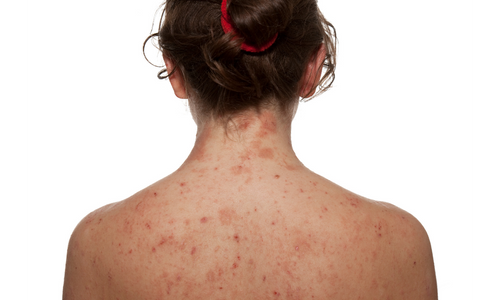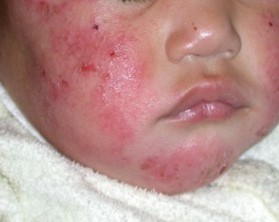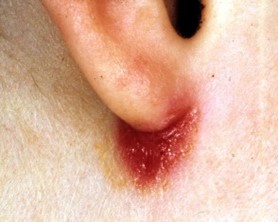
Atopic eczema (dermatitis); dry skin, rash It is a recurrent skin disease that manifests itself with itching and itching, progresses with exacerbations and improvements from time to time, and is more common in young children. Most individuals with atopic eczema have a personal or family history of allergic diseases such as allergic asthma and hay fever.
Why does Atopic Eczema occur?
The cause is not fully known. It is an extreme reaction of the skin's immune system to environmental and emotional factors. With the deterioration of the protective barrier feature of the skin, inflammation and an increased allergic response occur.
Is Atopic Eczema Contagious?
Atopic eczema is not a contagious disease.
How is Atopic Dermatitis diagnosed?
The diagnosis of atopic eczema is made by clinical signs and symptoms. No laboratory examination is needed to diagnose atopic eczema. There is no.
Are there factors that cause the disease to flare up?
Since the following factors may cause the disease to flare up, it is recommended to stay away from such situations.
These are; increased skin dryness (causes such as long and hot baths), scratching, infections caused by bacteria and viruses, emotional stress, sweating, temperature and climate changes, cleaners, soaps, detergents, woolen products. clothes, covers, dust and plant pollen, cigarettes, eggs, milk, peanuts, soybeans, fish, wheat allergies in babies and children, and contact with animal hair.
< strong>What should be taken into consideration in Atopic Dermatitis Treatment?
Since the disease is chronic and recurrent, the most important step in the treatment is to stay away from factors that exacerbate the disease. Unfortunately, current treatments cannot prevent the disease from recurring. Therefore, the best way to control the disease is to stay away from exacerbating factors while applying the treatment your doctor has prepared for you.
What are the drugs used in the treatment?
Treatment is determined according to the prevalence and severity of the disease. Superficial moisturizers, cortisone creams, other creams that reduce inflammation, anti-itch medications, ultraviolet light treatments, and defense system suppressants can be used.
Is Atopic Eczema a hereditary disease?
Atopic eczema is more common in people with a family history of atopic eczema, asthma and hay fever. Asthma and hay fever may occur in 1/3 of children with atopic dermatitis in the future.
What are the symptoms of Atopic Eczema?
Dry skin and intense itching are the most important symptoms of the disease. Especially disruption of sleep patterns and fatigue due to itching may cause attention problems in patients' school and work lives. Recurrent skin rash that may be in the form of dry, red, dandruff or oozing lesions. It occurs in different regions and features depending on the age of the patient.
Can Atopic Eczema symptoms occur in different regions depending on age?
- The symptoms of the disease in babies and young children usually appear on the face, elbows or inner knees. It occurs in the upper part of the body, but it can also be seen in other areas of the body.
- In older children and adults, it usually affects the hands, neck, and inner elbows. It affects the face, back of the knees and ankles.
Can Atopic Eczema occur with other diseases?
- Asthma and hay fever
- Herpes virus and recurrent infections caused by some bacteria
- Eye problems: such as conjunctivitis, cataracts
- It may be accompanied by conditions such as recurrent hand eczema.
How do moisturizers work?
Humidifiers; It should be used every day to prevent skin dryness. It is more appropriate to choose an odorless and colorless product
How to use cortisone drugs?
Cortisone creams/ointments; They control redness and itching during the active phase of eczema. Your doctor decides where and for how long the creams will be used. When cortisone creams are used together with moisturizers, the effect increases significantly and the risk of side effects decreases.
Are there any other creams that reduce inflammation?
Medicines containing Tacrolimus and Pimecrolimus on a regional basis reduce redness and inflammation. They do not cause thinning of the skin. The method of use is determined by the dermatologist. The most common side effects are burning and stinging sensations. They may increase the risk of skin infection. Long-term applications to exposed areas should be avoided and they should not be used simultaneously with ultraviolet light therapy.
What are the other treatment methods?
Itching relieving medications and ultraviolet light treatments are applied in hospital conditions in cases where eczema is common. In more severe eczema, drugs that suppress the immune system such as azathioprine and cyclosporine can be used. These treatments also have side effects and patients need to be monitored with regular blood tests and examination.
Is there a place for Herbal Treatments?
It is an alternative treatment option that can be effective. However, their use is not recommended since their contents and side effects are not fully known. They can cause liver problems.
http://www.turkdermatoloji.org



